ICC fugitive Netanyahu launches missile strike on Iran
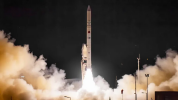 Israel has just launched missile strikes on Iran, including attacks on Iran's Natanz nuclear enrichment program which is under a mountain, and other military targets.
Israel has just launched missile strikes on Iran, including attacks on Iran's Natanz nuclear enrichment program which is under a mountain, and other military targets.
 Israel has just launched missile strikes on Iran, including attacks on Iran's Natanz nuclear enrichment program which is under a mountain, and other military targets.
Israel has just launched missile strikes on Iran, including attacks on Iran's Natanz nuclear enrichment program which is under a mountain, and other military targets.
 In this interview on Going Underground, Afshin Rattansi speaks to ex-US Secretary of State Colin Powell’s chief of staff and retired US Army Colonel, Lawrence Wilkerson.
In this interview on Going Underground, Afshin Rattansi speaks to ex-US Secretary of State Colin Powell’s chief of staff and retired US Army Colonel, Lawrence Wilkerson.
 Excellent history and current context of nuclear weapons and past and present threats. Compered by Daniel Aria, with Elijah Magnier and Don Debar. They conclude that only by changing the governments of the United States, its European vassals, the UK, Canada, Australia, New Zealand and Japan, can the people of those countries prevent the outbreak of nuclear war.
Excellent history and current context of nuclear weapons and past and present threats. Compered by Daniel Aria, with Elijah Magnier and Don Debar. They conclude that only by changing the governments of the United States, its European vassals, the UK, Canada, Australia, New Zealand and Japan, can the people of those countries prevent the outbreak of nuclear war.
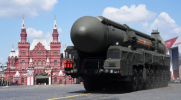 The rest of the big five need to match Moscow’s commitment to avoiding nuclear war, the Foreign Ministry insists. Moscow is “strictly and consistently” guided by the principle that a nuclear war can never be won and should never be fought, the Russian Foreign Ministry said on Wednesday, calling on other atomic powers to “demonstrate in practice” their own commitment to this.
The rest of the big five need to match Moscow’s commitment to avoiding nuclear war, the Foreign Ministry insists. Moscow is “strictly and consistently” guided by the principle that a nuclear war can never be won and should never be fought, the Russian Foreign Ministry said on Wednesday, calling on other atomic powers to “demonstrate in practice” their own commitment to this.
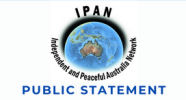 The US is establishing Australia as a proxy in a war against China; Prime Minister Albanese must stand up to the US and say NO to nuclear-capable B-52 bombers stationed on our territory; Australia must stay out of any US plans for a war against China. As revealed by the ABC in an investigative report on 31 October 2022, the United States has been secretly planning to station six, B-52 long range bombers in the NT, each capable of carrying conventional or nuclear payloads.
The US is establishing Australia as a proxy in a war against China; Prime Minister Albanese must stand up to the US and say NO to nuclear-capable B-52 bombers stationed on our territory; Australia must stay out of any US plans for a war against China. As revealed by the ABC in an investigative report on 31 October 2022, the United States has been secretly planning to station six, B-52 long range bombers in the NT, each capable of carrying conventional or nuclear payloads.
 Australia’s former Foreign Minister and NSW Premier, Bob Carr, will launch a new book on Australia’s role in nuclear weapons proliferation, past, present and future. The book will be launched at Gleebooks in Sydney on Tuesday 14 June at 6:00 pm. The book, Fact or Fission: The Truth about Australia’s Nuclear Ambitions, was written by Richard Broinowski, a distinguished former diplomat, who served as Australian ambassador to Vietnam, the Republic of Korea and Mexico.
Australia’s former Foreign Minister and NSW Premier, Bob Carr, will launch a new book on Australia’s role in nuclear weapons proliferation, past, present and future. The book will be launched at Gleebooks in Sydney on Tuesday 14 June at 6:00 pm. The book, Fact or Fission: The Truth about Australia’s Nuclear Ambitions, was written by Richard Broinowski, a distinguished former diplomat, who served as Australian ambassador to Vietnam, the Republic of Korea and Mexico.
 NEW GOVERNMENT
NEW GOVERNMENT
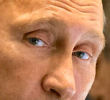 The disconnect between the Western and Russian narratives in the current conflict could prove fatal to the world, writes Scott Ritter.
The disconnect between the Western and Russian narratives in the current conflict could prove fatal to the world, writes Scott Ritter.
 There is in fact a Middle Eastern nation that is in fact in control of a vast, undeclared stockpile of nuclear weapons. This nation does have the capability of deploying those weapons anywhere in the region. It is not a signatory to the nuclear non-proliferation treaty and its arsenal has never been inspected by any international agency. But this nation is not Iran. It's Israel. (James Corbett)
There is in fact a Middle Eastern nation that is in fact in control of a vast, undeclared stockpile of nuclear weapons. This nation does have the capability of deploying those weapons anywhere in the region. It is not a signatory to the nuclear non-proliferation treaty and its arsenal has never been inspected by any international agency. But this nation is not Iran. It's Israel. (James Corbett)
The Transcript below has been republished from https://www.corbettreport.com/israelinukes/
TRANSCRIPT
DONALD TRUMP: I am announcing today that the United States will withdraw from the Iran nuclear deal. In a few moments I will sign a presidential memorandum to begin reinstating US nuclear sanctions on the Iranian regime. We will be instituting the highest level of economic sanction.
SOURCE: President Trump Gives Remarks on the Joint Comprehensive Plan of Action
When President Trump announced that the US was going to de-certify the Joint Comprehensive Plan of Action, better known as the 2015 Iran nuclear deal, and reinstitute sanctions on that country, one of the reasons he cited for that move was the presentation of “new” evidence from Israeli intelligence showing that the Iranians had lied about its nuclear program during the negotiation of that deal.
TRUMP: Last week Israel published intelligence documents long concealed by Iran conclusively showing the Iranians regime and its history of pursuing nuclear weapons.
BENJAMIN NETANYAHU: A few weeks ago, in a great intelligence achievement, Israel obtained half a ton of the material inside these vaults. And here’s what we got; 55,000 pages. Another 55,000 files on 183 CDs. Everything you’re about to see is an exact copy of the original Iranian material
SOURCE: Israeli Prime Minister Benjamin Netanyahu gives statement on Iran Nuclear Deal
Theatrical props and dramatic rhetoric aside, Israeli Prime Minister Benjamin Netanyahu’s recent presentation on the “Iranian nuclear deal” in fact contained no new information.
That Iran had explored a nuclear weapons program prior to 2003 has been known and admitted for years. That they have an archive of this information is not a violation of the Iranian nuclear deal completed in 2015. In fact, if anything, Netanyahu’s presentation actually proved the exact opposite of what was intended: Namely, that Iran is abiding by the terms of that treaty and is not covertly pursuing any nuclear weapons activity. That’s why they had to go back to 15 year old information and present it as if it was something new and revelatory.
But here’s the real head-scratcher in this new round of propaganda over the Iranian nuclear non-threat: There is in fact a Middle Eastern nation that is in fact in control of a vast, undeclared stockpile of nuclear weapons. This nation does have the capability of deploying those weapons anywhere in the region. It is not a signatory to the nuclear non-proliferation treaty and its arsenal has never been inspected by any international agency. But this nation is not Iran. It’s Israel.
This is the story of the real Middle East Nuclear Threat. You’re watching The Corbett Report.
Hand-wringing over Iran’s nuclear program is nothing new. It became a mainstay of western political discourse after an Iranian dissident revealed the Iranian government’s plans for a uranium enrichment facility in Natanz in August 2002. But the surprising fact for Americans and others around the world who get their information from the corporate mainstream media, is that Iran’s pre-2003 nuclear weapons program has long been known and admitted. Since 2003, when the program was scrapped, not a single piece of evidence has been presented (not even by Netanyahu or the Israeli government) that the Iranian government ever pursued anything other than what it said it was pursuing: a nuclear energy program.
Not that that fact has ever stopped Netanyahu from using any opportunity to use cartoon-level propaganda tactics to convince the world otherwise:
NETANYAHU: In the case of Iran’s nuclear plans to build a bomb, this bomb has to be filled with enough enriched uranium. And Iran has to go through three stages.
The first stage: they have to enrich enough of low enriched uranium. The second stage: they have to enrich enough medium enriched uranium. And the third stage and final stage: they have to enrich enough high enriched uranium for the first bomb.
Where’s Iran? Iran’s completed the first stage. It took them many years, but they completed it and they’re 70% of the way there.
Now they are well into the second stage. By next spring, at most by next summer at current enrichment rates, they will have finished the medium enrichment and move on to the final stage. From there, it’s only a few months, possibly a few weeks before they get enough enriched uranium for the first bomb.
Ladies and gentlemen, what I told you now is not based on secret information. It’s not based on military intelligence. It’s based on public reports by the International Atomic Energy Agency. Anybody can read them. They’re online.
So if these are the facts, and they are, where should the red line be drawn?
The red line should be drawn right here. Before Iran completes the second stage of nuclear enrichment necessary to make a bomb. Before Iran gets to a point where it’s a few months away or a few weeks away from amassing enough enriched uranium to make a nuclear weapon.
Each day, that point is getting closer. That’s why I speak today with such a sense of urgency. And that’s why everyone should have a sense of urgency.
SOURCE: Israel PM Benjamin (Bibi) Netanyahu Address to United Nations Sept 27, 2012
Of course, Iran was not pursuing nuclear weapons and Netanyahu’s Wile E. Coyote bomb and red line warnings bore no greater semblance to reality than the cartoon propaganda surrounding Saddam’s “weapons of mass destruction.” Not only did the IAEA repeatedly confirm that Iran never diverted any nuclear material into any military program, but even the US intelligence community itself conceded that Iran was not trying to build a nuclear bomb. Most remarkable of all was Mossad’s own assessment that Iran was “not performing the activity necessary to produce weapons.”
As I detailed earlier this year in “We Need to Talk About the Iran Protests,” fearmongering over Iran’s non-existent nuclear weapons program was the basis for an extraordinary series of measures against the country in recent decades. These measures included “NITRO ZEUS,” a full-scale military cyberattack against Iran the best-known element of which was Stuxnet, the military-grade cyberweapon co-developed by the United States and Israel that specifically targeted Iran’s nuclear enrichment facility at Natanz.
Iran’s non-existent nuclear program also provided the pretext for sanctions aimed at crippling the country’s economy, including the de-listing of Iranian banks from the Swift Network connecting the world’s financial institutions.
The fearmongers even went so far as to plant evidence of nuclear weapons involvement on Iran to further justify these attacks.
But the great irony is that there really is a nuclear armed nation in the Middle East. It is not a signatory to the Nuclear Nonproliferation Treaty. It does not allow inspections of its arsenal. It does not even officially acknowledge its stockpile of nuclear weapons. It has even resisted the push for an international treaty recognizing a nuclear-free zone in the middle east. And that country is Israel.
Sometimes ranked as the world’s sixth largest nuclear superpower, Israel actively pursued a nuclear program from the time of its inception as a state in 1948. By the late 1950s, they had begun building a reactor and reprocessing plant at Dimona with British and French aid. And by 1967, a classified CIA report estimated that Israel would be capable of producing a nuclear warhead in “six to eight weeks.” Shortly thereafter, it is believed, Israel began producing and stockpiling a nuclear arsenal.
OLENKA FRENKIEL: It was the young Shimon Peres, back in the fifties who negotiated a secret deal with the French to buy a nuclear weapons reactor like theirs. But while Dimona was going up, intelligence reports reached Washington that Israel was building an atom bomb.
Despite claims that Dimona was for peaceful purposes only, Israel’s leader Ben Gurion was summoned to Washington. President Kennedy feared an arms race in the Middle East and demanded inspections. But when inspectors finally entered the plant in May 1961 they were tricked. They were shown a fake control room on the ground floor. They were unaware of the six floors below where the plutonium was made.
PETER HOUNAM, Freelance journalist: Well this was something of great pride and almost a legendary story in Dimona, according to Vanunu. When the Americans came they were completely hoodwinked. All the entrances including the lift shafts were bricked up and plastered over so it was impossible for anyone to find their way down to the lower floors.
FRENKIEL: After Kennedy’s assassination the pressure on Israel was off. His successor Lyndon Johnson turned a blind eye. Then In 1969 Israel’s Golda Meir and President Richard Nixon struck a deal, renewed by every President to this day. Israel’s nuclear programme could continue as long as it was never made public. It’s called “nuclear ambiguity.”
The term “nuclear ambiguity,” in some ways it sounds very grand. But isn’t just a euphemism for deception?
SHIMON PERES, Former Prime Minister of Israel: If somebody wants to kill you, and you use a deception to save your life it is not immoral. If we wouldn’t have enemies we wouldn’t need deceptions. We wouldn’t need deterrent.
FRENKIEL: Was this the justification for concealing the floors of the plutonium reprocessing areas from the Americans, the inspectors, when they came?
PERES: You are having a dialogue with yourself, not with me.
FRENKIEL: But that’s been documented in a number of books.
PERES: Ask the question to yourself, not to me.
FRENKIEL: I mean, is it not true?
PERES: I don’t have to answer your questions, even. I don’t see any reason why.
FRENKIEL: Ambiguity is a luxury unique to Israel. Today the country’s an inspection-free zone, protected from scrutiny by America and her allies.
SOURCE: Israel’s Secret Weapon
Although estimates vary, it is now believed that Israel has somewhere between 75 and 400 nuclear warheads, and that it possesses the capability to deliver these warheads to Iran.
The existence of this stockpile, while known to governments around the world for decades, was only revealed to the public in 1986, when The Sunday Times published photographic proof and a detailed account of Israel’s secret nuclear weapons program. That story was provided by Mordechai Vanunu, a technician at the Dimona facility, who spent decades behind bars for his part in revealing this truth to the world.
NARRATOR: On October 5th, 1986, The Sunday Times announced they had evidence to prove that Israel had become the world’s sixth biggest nuclear power, having developed their arsenal beneath the Negev desert at Dimona. Photographs like this were given to the Sunday Times by a former technician at Dimona, Mordechai Vanunu.
[…]
Mordechai Vanunu’s family, Moroccan Jews, settled in the Negev in the early 60s, inspired by the idea of being a part of Israel. Vanunu did national service in the army. Then, while he worked at Dimona he began studying philosophy. He became active in student politics. He opposed Israel’s invasion of Lebanon. Vanunu came to believe that Israel’s nuclear development program was immoral. He left Damona and, eventually, Israel itself.
Vanunu arrived in Sydney armed with photographs he’d taken inside Dimona. Here, he turned his back on Judaism and became a Christian. He met Oscar Guerrero, a Colombian journalist who urged him to sell his secrets to The Sunday Times. His evidence was processed at a local photo shop. Vanunu talked openly about what he’d done.
It’s said that by the time Vanunu arrived in London on September the 12th, 1986, Australian intelligence had already alerted MI6 and the CIA, and Mossad—Israeli intelligence—had already begun questioning his family in Israel. The Sunday Times disguised their informant and moved him from place to place for protection. But in Leicester Square one day, Vanunu met a blonde who called herself “Cindy,” a beautician from Florida. Meanwhile, Oscar Guerrero, eager to profit from what he knew, turned to The Sunday Mirror. Vanunu’s photograph appeared on page one. Vanunu began to despair. At this point, Cindy was able to lure him to Rome to sp end the weekend with her at her sister’s apartment. Not once did Vanunu suspect that Cindy was a Mossad agent and that this was the beginning of a plot to kidnap him.
In Rome, the tactics of the Mossad agents changed dramatically.
MEIR VANUNU: In the apartment, two Israeli agents attacked him and bit him and strangled him really hard. And then chained him, injected drugs [in]to his body. And later on he woke up in a small cell on a boat. The boat went to Israel for a few days and he arrived to Israel on the 7th of October, 1986.
Vanunu was assumed dead until he turned up weeks later in Tel Aviv. Vanunu himself, on his way to court, gave the first clue of what had happened to him. Scrawled on his hand was the message “Vanunu was hijacked from Rome, Italy. 30.9.86. BA 504.”
But a key element of the story is missing from the handful of documentaries that acknowledge Israel’s nuclear stockpile. Namely, that these weapons were not merely developed by Israeli scientists working in isolation, but with the aid of a nuclear smuggling ring that helped develop and advance Israel’s arsenal by stealing important nuclear technologies from their “ally,” the United States. These rings and their activities have been known about and even investigated by the FBI for decades, but largely kept secret from the public.
It has fallen to researchers like Grant F. Smith of IRMEP.org, author of Divert!: NUMEC, Zalman Shapiro and the diversion of US weapons grade uranium into the Israeli nuclear weapons program, to piece together the story from the documents that have been released. On The Corbett Report in 2012, Smith revealed the name of one of the high-powered Israeli officials who was at the heart of a plot in the 1970s to smuggle 800 nuclear triggers from the United States.
GRANT F. SMITH: In terms of the FBI uncovering a multi-node network, this one happened to be centered in California. MILCO was a company that was incorporated in 1972 by a man named Richard Kelly Smyth. He was discovered sending 800 krytrons, which are dual-use items that could be used to trigger nuclear weapons. When he was discovered doing that, he skipped bail in the mid-1980s and disappeared until he was picked up by Interpol in the early part of 2000.
And so the story is interesting and explosive, because after multiple attempts and denials we had a document release in which the key contact, or one of the key contacts that Smyth was meeting with to set up sales in Israel was none other than Benjamin Netanyahu. And so the document—which I’m kind of holding up right here for the people who are on video—actually names Benjamin Netanyahu as being an employee of Heli Trading Company, which was the node in Israel that would receive Ministry of Defense requisitions that they would pass on to MILCO.
And so the interesting thing about this, of course, is the high-profile nature of Benjamin Netanyahu, [and] the fact that the smuggling ring ring leader has been identified as Arnon Milchan, a person any American knows for his movie productions such as Pretty Woman and other favorites, who is running this and who a recent book has named as being a top economic espionage fly a spy for LAKAM, who worked under Benjamin Bloomberg and Rafi Eitan. But the FBI documents that we published on July 4th related to an antiwar.com story which was really short and direct. And its core focus was on the fact that in a period when Netanyahu was building himself up as a leader in the terrorism industry—hosting major conferences, having just returned from his studies in the United States, hosting major conferences in the Jonathan Netanyahu Terrorism Institute, named after his brother who was killed on the Raid on Entebbe.
Here’s a person who was supposed to be working as a furniture company executive, and yet these documents which are very credible because of what they were—which is testimony from Richard Kelly Smith after he was returned his exile overseas and finally forced serve a prison sentence. These were the statements he made to an FBI agent in a district attorney office when they debriefed and wanted to know what the extent of the nuclear technology smuggling network was and—boom!—there’s Benjamin Netanyahu.
SOURCE: Corbett Report Radio 214 – Israel’s Nuclear Smuggling with Grant F. Smith
Benjamin Netanyahu. And now this unindicted nuclear smuggler is lecturing Iran about a 15 year old, long-acknowledged nuclear weapons program that never produced a single nuclear weapon.
Even more worryingly, Israel’s nuclear knowledge has not only helped to arm its own nation, but actually helped to proliferate nuclear weapons to Pakistan through the so-called Khan network. One of the men who helped to transfer the nuclear triggers used in the construction of the Pakistani bomb was Asher Karni, an orthodox Jew living in South Africa who had been a major in the Israeli army prior to emigrating to Cape Town. Upon his arrival there in 1985, he began teaching Torah at the local synagogue and educating Jewish youth, encouraging them to relocate to Israel.
In 2004, U.S. authorities arrested Karni for his role in supplying the nuclear triggers and in 2005 he was sentenced to three years in prison. It has never been officially explained why this Israeli citizen and former Israeli military officer was interested in helping proliferate nuclear technologies to Pakistan.
But perhaps the greatest irony of all is that it is Iran who has been arguing for decades that the Middle East should be a nuclear-free zone. The idea was first floated by the Shah in 1969, and was first formally proposed by Iran in a joint UN General Assembly resolution, but the idea failed to garner any support. The idea was again raised by then-Iranian President Ahmedinejad in 2006 and yet again by then-Iranian Foreign Minister Mottaki in 2008, but these calls to banish nuclear weapons from the Middle East have not even been acknowledged by the west, let alone seriously considered.
Now more than ever, the prospect of a nuclear-free Middle East seems the only way to prevent a nuclear conflagration that threatens to draw in the world’s superpowers, and yet the idea is being ignored by Israel and its staunchest ally, the United States.
Why does Israel refuse to declare its nuclear weapons stockpile? Why do they refuse to sign on to the Nuclear Nonproliferation Treaty?
Why do they refuse IAEA inspections of their nuclear facility?
Why did they kidnap and imprison Mordechai Vanunu for 18 years for providing the proof of this nuclear program?
And perhaps most importantly, why does the United States, the only country who could single-handedly force NPT compliance from Israel, still refuse to even admit the openly-acknowledged status of Israel as a nuclear power?
Don’t hold your breath waiting for these questions to be answered by the teleprompter readers on the nightly news.
Still, as even many in the mainstream are now admitting, Netanyahu’s presentation on Iran’s nuclear non-secrets are a cheap display of political theatrics. The only thing he ended up doing is underlining the point that Iran, unlike Israel, fully cooperated with the IAEA, lived up to its obligations as a signatory to the nuclear non-proliferation treaty, and pointedly has not violated the 2015 nuclear deal.
And now that the United States has allowed the Israeli tail to wag the American dog once again by de-certifying that Iranian deal without valid cause, negotiators in North Korea and elsewhere will be watching, reminded yet again that a promise from the American empire isn’t worth the signed agreement it’s written on.
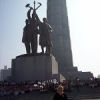
An Arab-speaking friend of mine just sent me his translation of an article in Al-Akhbar, written by a journalist who was actually in North Korea recently -- unlike most American journalists who are basically arm-chair speculators who wouldn't go near Pyongyang with a ten-foot pole and, instead, just want to make up negative stories.
The author was writing about celebrations of the 69th anniversary of the founding of the Democratic People's Republic of Korea few days ago. She says, "North Koreans have not been able to relax and take a breath from hostilities since the end of World War II". Good grief. That's a hecka long time to live in fear. And also remember that in the two years after 1950, five million Koreans were slaughtered by American invaders. Think Iraq's Shock and Awe -- only on a much larger scale. Pyongyang, for instance, was totally flattened, all due to the same type of lies that started the U.S. "war" on Iraq.
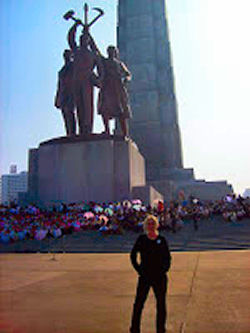
The article's author accompanies a Lebanese soccer team to the Hermit kingdom and here are the results.
"Months before my trip, I learned by chance that a soccer match would be bringing the Lebanese national football team to play the Korean team in Pyongyang, so I applied to accompany the team. 'No kidding!' was the first reaction of my colleagues, who admitted that no one 'even thinks of escorting the sports teams there'.
"'Why are you in Pyongyang anyway?' is a question I've been asked constantly both before and during my five-day visit to the Korean capital, and before even reaching it." She was given many warnings before she left. "Do you know that you will not be able to talk to anyone on the street over there? You do know that you won't be able to write a political article when you get back, right? And after this trip, you will not be able to get any visa to any other country!" Interesting. Sounds more like the USA's policy than North Korea's. She was also warned that, "They will take away your books, pens, camera and phone."
"It was a tiring journey and after long travel, we got to Beijing and from there to Pyongyang via Korean Airlines. The elegant flight attendants smiled, but nothing reduced our tension, enthusiasm and adrenaline as we entered Pyongyang airport, which was empty of any other passengers. The inspection was precise, automatic and manual, the security men and women checked our faces carefully. One of the security personnel at the entry window smiled and stamped my passport, giving me permission to enter. No one searched my larger suitcase, and the security men did not open my carry-on bag. They asked me very gently to hand over my phone and the camera. After a few seconds, they returned them to me without any question, request or condition." TSA, eat your heart out!
"Tension gradually disappeared and the view of green fields along the road leading to the city helped to calm minds and souls. We entered Pyongyang at sunset. Workers and staff returning from their jobs, walking and biking, wide paved clean streets semi-empty of cars, and lots of trees on both sides of the road. Pyongyang welcomes its visitors with an amazing serenity. The calmness was even present inside the hotel's huge lobby, until it was broken by the noise of the Lebanese soccer team complaining about not having wi-fi, only cable internet.
"Despite the weight of the boisterous Lebanese presence, the staff maintained permanent warm smiles, quick service and a helpful response to all demands. The female cleaning workers apologized shyly when they entered our rooms to perform their duties. They noted that I am the only woman in the Lebanese delegation. The next day, they replaced the blue bed sheets with others embroidered with pink flowers. Koreans do not pretend their kindnesses. They perform them every day, in their smiling greetings in the elevators, in the shop, and in the restaurant inside the hotel.... On the street, however, passers-by look at you directly in the eyes with a little surprise and a lot of seriousness." Americans could use a few such lessons in politeness.
"The traffic of the passers-by does not get lighter until nightfall. Everyone is walking with fast steps, walking a long distance on their feet. No one has a private car, and the public transportation is very small compared with the population, so the buses and trams are always overcrowded. Women, as well as men, take part in cleaning the streets of the city, mowing its grass, arranging the squares' gardens and paving their pavements. Hygiene and cleanliness are eye-catching in the main and secondary streets and even in the underground tunnels of the road. The beautiful and quiet city is lying between two rivers, with a constant human movement during the day. The atmosphere is polluted by the smoke of nearby factories, but the abundance of trees does not make you feel the smoke. The most striking aspect of the city are the green, pink, yellow and blue buildings, like huge Lego pieces, a beautiful childish feeling in a nuclear capital. The wide sidewalks include a restless bicycle line and very few passers-by talking on their cell phones, which most often takes place in the vicinity of the train station."
Can you imagine Americans taking care of their cities with such pride? Or even putting their cell phones down long enough to enjoy the beauty of their cities? Nah.
"Thus, a visitor to Pyongyang is able to restore the pleasure of seeing the faces of the passersby and their features -- their heads in their natural position, raised, exposed, not curved and attached to cell phones. Revolutionary posters and national emblems adorn some columns and walls and pictures of flowers are also spread across the city and on locally manufactured products. The magnolia flower is a national symbol of the country. There are public parks filled with them in the city. In the residential neighborhoods, there are public parks, playgrounds for children and others facilities for sports. In the afternoon, these playgrounds are filled with boys and young people who practice their various sports. Some families also stretched on the green gardens and rest from productive daytime labor."
And there's culture here too. "There is a huge People's Library building, an Art Museum, the National Theater, the Cinema Hall, the Recreation Center, Hairdressing and Body Care. Here is an outdoor music band playing and practicing, and women in colorful traditional costumes practicing for the upcoming National Day celebrations.
"The silence of the city is enchanting, but it may sometimes feels sad and gloomy. People are calm and tired as well. Fatigue appears on faces and slim bodies -- the hard work of a country under the harshest economic sanctions in the world, and in political isolation for decades. In fact, Koreans have not yet taken a safe breath since the end of the Second World War! After the Japanese occupation was disbanded in 1945, the Korean War between its northern and southern parts came only five years later, with much blood spilled and divisions within one people on a land no longer united." That "war" on Korea was sad, sadistic and unnecessary in my humble opinion -- even after watching too much MASH.
"The Americans had completely destroyed Pyongyang, and its people rebuilt it with their hands, but the truce that ended the Korean War in 1953 did not end the tragedies of the Koreans. While the country began to promote urbanization, industrialization and agriculture, it was also hit by floods that caused great famine, destruction of infrastructure and land between 1995 and 1998, and new floods within the last year. Despite all this, many today do not speak about what the Korean people have suffered and still suffer up to this moment. All that matters to Western and U.S. propaganda makers is to present an exaggerated, cynical and often unrealistic picture of the most anti-US radical regime in both word and deed since the collapse of the Soviet Union (USSR).
But what about the citizens themselves and the rise of their country and the challenges they face daily due to sanctions? What about their achievements in sports and music despite everything? There is no mention of this in the Western daily media because it does not serve the cartoonish picture that the Western media seeks to circulate.
"During my stay in the Korean capital, I took 166 photos with my camera. The Korean attendant of the Lebanese team asked to see some of them but then deleted only two pictures because one of them had a slanted frame that had an impact on the image of the late Korean president's face; and the other because it showed one of the slogans written on the walls in a truncated manner that diminished its meaning. The slogan, by the way, says, 'The more crises ... the more straight ahead we go.'
The main feeling in Pyongyang seems to be, "What does the West want from us? To surrender to their sanctions?"
Then the journalist had the same experience that I had when I was in North Korea a few years ago. "To provide visitors to Pyongyang with an accompanying person to go with them wherever they go outside the hotel, is known to anyone who wants to visit the Democratic People's Republic of Korea, and if the visitor is a journalist, the escort seems inevitable. The accompanying person of the Lebanese sport team in Pyongyang, named Sen, was joined by another accompanying person who serves as an interpreter (translator) for the Asian Football Confederation (AFC), named Ree. Sen and Ree were two young men in their 20s. They committed no repressive behavior. They did not let us feel that there was any censorship or restraint in our movement. On the contrary, they eased our visit in more than one place. Sen, for example, organized tours of the Zuchei Tower, Kim Il Sung Square and the largest sports stadium in the world -- while Ree, the interpreter, spoke to me about politics, the 'nuclear subject', life in general and the conditions of Lebanon and its region."
Regarding the nuclear subject, Ree asked her, "Have you heard the news today? What do you think about what happened," with regard to the test of the hydrogen bomb. The journalist had followed the news on TV in her hotel room, which received Chinese and Japanese TV channels, France 24, English Aljazeera and Russia Today (RT).
She answered, "From one side, I do not like the idea of a nuclear bomb, and it frightens me; but from the other side, you are telling the world that you are strong as well." Ree smiled and said, "Do not be afraid, we will not throw the bomb at your country, it is only for the peace of our country."
Ree learned his excellent English at the Pyongyang Institute of Languages. What? Not by watching Sesame Street?
"'It is our right to protect the security of our country and our people,' Ree explained regarding his view of possessing of nuclear weapons, and then asked, 'How should we act, for example, toward the implementation of military drills on our borders by the United States and South Korea? Why can't we address their constant threats?' He paused a little then continued saying: 'What do they want from us? To surrender and submit to their sanctions?'
"On one occasion, Ree gently invited me to taste Korean beer, Taedonggang, made locally from white rice. We sat in the lobby of the hotel more than once to continue our discussions on a variety of things. The young man was surprised when I told him that South Lebanon had been under Israeli occupation for years and he admired the popular and armed resistance that drove the Israeli enemy out of Lebanese territory. 'Resistance and patriotism are the most important things I have learned in life,' Ree said. This young Korean dreamed of visiting some of the world's capitals that he hears about while accompanying tourists. His face changed positively when I told him that in Lebanon, there are many who saw Israel and the United States as enemies, and that I, too, hated U.S. imperialism." Me too!
"'I learned yesterday that the U.S. threw a bomb in Syria and killed many civilians, and that saddened my heart,' he said seriously and honestly. Ree was shocked when he learned that in Lebanon we had to pay huge sums for medicine, education and sports -- while they were all free in his country.
"Ree accompanied me at the Kim Il Sung Stadium during the enjoyable Korean-Lebanese match. He was enthusiastically encouraging his own country's team yet delighted me by being the only person among the 29,000 spectators who encouraged the Lebanese team. Then he reassured me: 'No one will bother you. People here are friendly.'
"He worked hard to convince the organizers to allow me to take pictures from the pitch, because I was not a certified press photographer. He succeeded and, thanks to him, I was able to take pictures of the Lebanese team and the match. In the break between the two halves, we talked about God and faith, and we agreed that faith in one's own abilities is very important.
"When we left North Korea, Ree escorted us to the airport, to say farewell to us, and we shook hands with some team members with affection. 'You are not alone,' I finally told him. 'We are with you and understand your suffering because we have lived wars and tested its horrors in Lebanon as well.' Ree lowered his eyes and said, 'Thank you.'
"Ree told me in an earlier meeting that he listens to Korean and Russian music because 'music makes him feel calm and with tranquility,' after long and hard work as an interpreter. So, I left him a Fayrouz Ziad Rahbani album as a gift, wishing him to have the best and the most elegant image of Lebanon.
In the Lebanese journalist's next dispatch, she wrote, "Leave them in peace. They are the workers who go to their jobs and factories on foot every day. They are the children who learn in their schools that patriotism is like a mother's love. They are the people of Pyongyang, so good and so shy. They are the tired ones of the injustice of the entire world. They are hard-working in order to remain in their world, which stands in the face of imperialism in all its forms.
"North Korea is the sun that shines on the impact of music and factory wheels.
She is the state that, despite the blockade, is keen on free medicine and education, green gardens, superior sport and early music education. They are the thin bodies and slim faces, their daily worries greater than the mountains. Leave them in peace, and do not increase their load more."
Holy crap. North Koreans receive free "MediCare for all" and their government actually cares about them? Wow.
"You in the West talk about them with arrogance and irony, describing their world as 'closed', and treating them as 'robotic' -- but for God sake, look in the mirror and in the images spread on your own 'social' networking sites. You are the robotic ones to the limit of boredom. You are robotic in your external shapes that don't match your identities; in the way you speak; your clothes; your smiles; your jokes; your mainstream music; the absence of your wrinkles; the forms of your relationships even including the intimate ones; and the way you live in the smallest details. Look around you, your dominant culture isolates free thinkers, and your generalized ideas classify the different as 'backward'. You are boasting of your freedom, but the more allegedly open-minded you become, the more racism increases. And your closed mindset builds up even more when borders are erased. You too are walled in, but while your wall is huge, the Korean wall is ... Great!
"I will not pretend to know the truth about North Koreans' lives, their mental state, and how they think. I did not ask them if they were happy, and I did not know whether their love for their leaders was real, but certainly, their love for their country is clear. They are tired and admit it, even in their songs. They are honest. I do not need to ask them this. A look in their eyes says enough. They teach you kindness and they are the most suffering people. They forgive us, although they are floundering in crises that they are not guilty of. They forgive us, we who stood watching them suffering and did nothing.
"I will not claim that the Koreans are perfect, and I will not speculate on what is best for them, but I will salute their productive daily fatigue. I will silence myself in particular, the tourist journalist who came from Lebanon. How can a visitor coming from Lebanon, a country of garbage and feces in food, sewage in fresh water, and poison in medicine, feel superior to any other country in the universe?
"We may deserve what the U.S. and the West have forced upon us by their excessive speed of culture and intellectual flattening, and we may also deserve nuclear missiles sent from oppressed peoples because we do not want to see their tragedies... But surely no one in the world deserves the kindness of the Korean people and their shy smiles. Therefore, let them alone, they do not want anything from us. Let them exist in peace and stop inflicting your misery on them. Perhaps, just then, you may also wake up to your lives, look into the eyes of your beloved ones, finally see the depth of your own tragedy -- and also begin to resist."
PS: But what does all this mean? If North Korea isn't a Bad Guy after all, then why is the American media trying so hard to make it into one? Why? For money of course. Ka-ching.
Endless "war"? Cold War on Russia and China? War on Muslims? War on crime, war on drugs, war on American protestors? War on Black people, war on immigrants, war on kids, war on pets, war on climate, war on grandma -- whatever.
As long as there's a "war" going on somewhere, then there's money to be made by people who are not us.
Original article by Jane Stillwater at https://jpstillwater.blogspot.com/2017/09/not-lost-in-translation-lebanese-news.html
********
And while you're at it, please buy my books -- thus helping me support my addiction to Justice and Truth. http://straitwellbooks.blogspot.com/2016/04/our-top-best-seller-right-now-is-bring.html
Plus here's a sneak preview of my latest book, a thrilling murder mystery entitled "Road Trip to Damascus," hopefully coming out by February 2018:
.
 What are we to make of Hillary Clinton's emails, recently revealed by Wikileaks? Here we examine the first two that were released. "In my view Clinton is as mad as a cut snake. You will see through these documents that the emphasis is entirely on Israel's interests, not America's, and whatever she thinks they are not the same. Of course she is completely in the hands of the Zionist lobby, as was Australia's recent Prime Minister Gillard, who lent her services to the Clinton campaign. But then Clinton is in the hands of anyone with money and the power to swing votes. She talks of Israel's security dilemma. Well, that's a good one: a state with an estimated 200-400 nuclear weapons (yes, a couple would be enough) facing states without even one has a security dilemma? ..." (Earth to Earth, Turkey.)
What are we to make of Hillary Clinton's emails, recently revealed by Wikileaks? Here we examine the first two that were released. "In my view Clinton is as mad as a cut snake. You will see through these documents that the emphasis is entirely on Israel's interests, not America's, and whatever she thinks they are not the same. Of course she is completely in the hands of the Zionist lobby, as was Australia's recent Prime Minister Gillard, who lent her services to the Clinton campaign. But then Clinton is in the hands of anyone with money and the power to swing votes. She talks of Israel's security dilemma. Well, that's a good one: a state with an estimated 200-400 nuclear weapons (yes, a couple would be enough) facing states without even one has a security dilemma? ..." (Earth to Earth, Turkey.)
Earth to Earth, writes about Hillary's emails:
"In my view Clinton is as mad as a cut snake. You will see through these documents that the emphasis is entirely on Israel's interests, not America's, and whatever she thinks they are not the same. Of course she is completely in the hands of the Zionist lobby, as was Australia's recent Prime Minister Gillard, who lent her services to the Clinton campaign. But then Clinton is in the hands of anyone with money and the power to swing votes. She talks of Israel's security dilemma. Well, that's a good one: a state with an estimated 200-400 nuclear weapons (yes, a couple would be enough) facing states without even one has a security dilemma?She talks of trading off Syria for Iran, i.e. if the United States removes Bashar al-Assad then Israel might not attack Iran. We know this is what both Israel and Saudi Arabia were encouraging in the time of the Bush administration. They wanted the U.S. to do it. Can anyone imagine what the consequences would be of military strikes on live nuclear reactors?
Yet here Clinton talks of such a war as if it's something on the supermarket shelf she can't decide whether to pick up. In the second email, she talks of U.S. reluctance to launch an air war on Syria. In fact that is exactly what it wanted, but was blocked by Russia. (Thank heavens!) Never mind, says Clinton, we can do it without the U.N. and Russia won't object.
This is total crap. From the word go, it was clear that Russia had far too much invested in Syria, in the preservation of a government chosen by the Syrian people and in the preservation of its own regional and global strategic concerns, to let Syria go. Clinton thinks the U.S. could just walk in and bomb the Syrian air force into submission. This was never going to happen and clearly someone with more sense than Clinton prevailed. She says that Syria is not like Libya, where the 'opposition' was unified (I think this is the word she uses.) Again, crap. There was never any Libyan opposition strong enough to fight any further than the municipal limits of Benghazi. The 'rebels' were the window dressing for the full scale air assault by the U.S., Britain and France. At no stage were they unified. These emails at least help us to understand why Clinton could be the/one of the most dangerous U.S. presidents ever elected. Don't forget her threat to obliterate Iran if it attacks Israel (never likely - it would be the other way around but geared to look like an Iranian attack or a preemptive Israeli attack) and don't forget her threat of a few days ago, to renew the war on Syria and destroy Assad. Where we started we finish: this is exactly what Israel wants and there is absolutely nothing in it for the U.S. How shocking is it that the mainstream media has closed ranks behind this lying, corrupt and very dangerous person and has launched the most vicious campaign I have ever seen against a presidential candidate, Donald Trump." (Earth to Earth, Turkey)
Iran has been inspected and reinspected for nuclear weapons, revealing none, like the weapons of mass destructionn (WMDs) that did not exist in Iraq, but these two emails from Hillary Clinton (recently available by Wikileaks) reveal a focus on the idea that Iran may develop nuclear weapons capability. Israel is not officially supposed to have nuclear weapons, but Mordechai Vanunu, a former Israeli nuclear technician and peace activist revealed details of Israel's nuclear weapons program to the British press in 1986.[1] In Hillary Clinton's emails below, which were written in 2012, she operates on the premise that Israel has nuclear weapons and that the United States approves of this and wants Israel to maintain nuclear hegemony in the region. She sees solidarity between Iran and Syria as inimical to this state of affairs, reflecting the US claim that Iran aims to develop nuclear weapons as a deterrent to Israel bossing the region around. She says, "The result would be a precarious nuclear balance in which Israel could not respond to provocations with conventional military strikes on Syria and Lebanon, as it can today." Of course its Arab enemies accuse Israel itself of provocation and Israel has a history of acts of terrorism.[2] Hillary Clinton also suggests that, if Iran got nuclear weapons then Saudi Arabia might expect nuclear weapons. But that hasn't stopped the United States supplying Saudi Arabia with every other kind of weapon, as its top world customer.[3]
In order to prevent the mooted scenario of an independent Arab state catching up with Israel, Clinton recommends destroying the relationship between Syria and Iran by destroying the Syrian government by promoting a civil war. Well we now know the result of Hillary's preferred policy has been mayhem in Syria and Iraq, spreading all the way to Europe in the largest wave of refugees since the second world war. Clinton gives her opinion that if Iran were to get nuclear weapons it could use them as a deterrent to Israel's military threats in the region, yet she also reveals that she believes that Israel is on the point of "launching an attack on Iran that could provoke a major Mideast war". [Ed. This email was written some time in May 2012 and Israel has not engaged in nuclear attacks on the region yet.]
She also claims that Russia would not "stand in the way" if the [United States] were to intervene in Syria (meaning stoke war there). But she is writing some time in May 2012 and Putin only became Russian president in May 2012. (Relatedly, Clinton also reveals that she knew the US had stirred the pot in Kosovo.) These emails are now about four years and a few months old. Since Hillary wrote them, we have seen that Russia finally did intervene in Syria, although it stayed out of that fight for as long as possible. It unwisely failed to veto US interference in Libya, but the consequences of US/NATO intervention in Libya were so horrible that it became unlikely that Putin would go along with such a thing again. US interference in Ukraine put Russia in a position where it had to draw a line as it became clear that the US was surrounding Russia with military bases and attempting, through NATO, to alienate Russia's allies and trade partners.
It seems that Hillary's United States wants to use Israel to promote its own interests in the Middle East but this would go against Russia's and Arab interests, with the exception of Arab states, such as Qatar and Saudi Arabia, which have aligned with Israel and the United States/NATO. Qatar and Saudi Arabia are financing religious terrorism (ISIS and others) against Syria, Iraq and Libya. Turkey, led by a pro-Muslim Brotherhood president,[4] was seen as a US/NATO ally and was benefiting by buying cheap oil through ISIS but it relies a lot on trade with Russia and recently has apologised to Russia for shooting down a Russian plane.
Hillary's reductionist descriptions[5] of the presidents of the only two secular states in the Middle East - Libya (now destroyed by US/NATO) and Syria - as brutal dictators - are being used to justify her recommendation of US intervention to create civil wars all over the Middle East and to destroy Syria and isolate Iran. Going into the future, towards this scenario, Saudi Arabia has been allowed to maintain among the most brutal regimes on the planet, with total subjugation of women as slaves; it has been allowed to engage in genocidal war in Yemen, not only with impunity, but Mr Trad, Saudi Arabia’s ambassador at the UN in Geneva, was elected as chair of a panel of independent experts on the UN Human Rights Council in June 2014. Meanwhile Ms Clinton is part of a U.S./NATO wolf-pack that pretends to be 'intervening' in the Middle East to rid it of 'brutal dictators'.
What can we make of these emails, of the woman who wrote them, of the country that she represented as Secretary of State, of her candidacy for its president? For what reason should the world allow Israel to defend its position and call the shots in the region, on behalf of non-regional players who are interested in controlling the region's oil and challenging Russia and China's interests in the region? It seems obvious that Israel must share some of its territory with a new Arab state called Palestine, sooner or later, and disarm its nuclear stores. It seems obvious that the United States should establish good relations with Russia, which could help balance out expansionary ideas in China or for a caliphate in a damaged Middle East, instead of ramping up its military displays in Europe and pushing at Russia's borders.
The best way to help Israel deal with Iran's growing nuclear capability is to help the people of Syria overthrow the regime of Bashar Assad.
Negotiations to limit Iran's nuclear program will not solve Israel's security dilemma. Nor will they stop Iran from improving the crucial part of any nuclear weapons program — the capability to enrich uranium. At best, the talks between the world's major powers and Iran that began in Istanbul this April and will continue in Baghdad in May will enable Israel to postpone by a few months a decision whether to launch an attack on Iran that could provoke a major Mideast war.
Iran's nuclear program and Syria's civil war may seem unconnected, but they are. For Israeli leaders, the real threat from a nuclear-armed Iran is not the prospect of an insane Iranian leader launching an unprovoked Iranian nuclear attack on Israel that would lead to the annihilation of both countries. What Israeli military leaders really worry about -- but cannot talk about -- is losing their nuclear monopoly. An Iranian nuclear weapons capability would not only end that nuclear monopoly but could also prompt other adversaries, like Saudi Arabia and Egypt, to go nuclear as well. The result would be a precarious nuclear balance in which Israel could not respond to provocations with conventional military strikes on Syria and Lebanon, as it can today.
If Iran were to reach the threshold of a nuclear weapons state, Tehran would find it much easier to call on its allies in Syria and Hezbollah to strike Israel, knowing that its nuclear weapons would serve as a deterrent to Israel responding against Iran itself.
Back to Syria. It is the strategic relationship between Iran and the regime of Bashar Assad in Syria that makes it possible for Iran to undermine Israel's security — not through a direct attack, which in the thirty years of hostility between Iran and Israel has never occurred, but through its proxies in Lebanon, like Hezbollah, that are sustained, armed and trained by Iran via Syria. The end of the Assad regime would end this dangerous alliance. Israel's leadership understands well why defeating Assad is now in its interests. Speaking on CNN's Amanpour show last week, Defense Minister Ehud Barak argued that "the toppling down of Assad will be a major blow to the radical axis, major blow to Iran.... It's the only kind of outpost of the Iranian influence in the Arab world...and it will weaken dramatically both Hezbollah in Lebanon and Hamas and Islamic Jihad in Gaza."
Bringing down Assad would not only be a massive boon to Israel's security, it would also ease Israel's understandable fear of losing its nuclear monopoly. Then, Israel and the United States might be able to develop a common view of when the Iranian program is so dangerous that military action could be warranted. Right now, it is the combination of Iran's strategic alliance with Syria and the steady progress in Iran's nuclear enrichment program that has led Israeli leaders to contemplate a surprise attack — if necessary over the objections of Washington. With Assad gone, and Iran no longer able to threaten Israel through its, proxies, it is possible that the United States and Israel can agree on red lines for when Iran's program has crossed an unacceptable threshold. In short, the White House can ease the tension that has developed with Israel over Iran by doing the right thing in Syria.
The rebellion in Syria has now lasted more than a year. The opposition is not going away, nor is the regime going to accept a diplomatic solution from the outside. With his life and his family at risk, only the threat or use of force will change the Syrian dictator Bashar Assad's mind.
Email from Hillary Clinton: UNCLASSIFIED U.S. Department of State Case No. F-2014-20439 Doc No. C05794498 Date: 11/30/2015
The Obama administration has been understandably wary of engaging in an air operation in Syria like the one conducted in Libya for three main reasons. Unlike the Libyan opposition forces, the Syrian rebels are not unified and do not hold territory. The Arab League has not called for outside military intervention as it did in Libya. And the Russians are opposed.
Libya was an easier case. But other than the laudable purpose of saving Libyan civilians from likely attacks by Qaddafi's regime, the Libyan operation had no long-lasting consequences for the region. Syria is harder. But success in Syria would be a transformative event for the Middle East. Not only would another ruthless dictator succumb to mass opposition on the streets, but the region would be changed for the better as Iran would no longer have a foothold in the Middle East from which to threaten Israel and undermine stability in the region.
Unlike in Libya, a successful intervention in Syria would require substantial diplomatic and military leadership from the United States. Washington should start by expressing its willingness to work with regional allies like Turkey, Saudi Arabia, and Qatar to organize, train and arm Syrian rebel forces. The announcement of such a decision would, by itself, likely cause substantial defections from the Syrian military. Then, using territory in Turkey and possibly Jordan, U.S. diplomats and Pentagon officials can start strengthening the opposition. It will take time. But the rebellion is going to go on for a long time, with or without U.S. involvement.
The second step is to develop international support for a coalition air operation. Russia will never support such a mission, so there is no point operating through the UN Security Council. Some argue that U.S. involvement risks a wider war with Russia. But the Kosovo example shows otherwise. In that case, Russia had genuine ethnic and political ties to the Serbs, which don't exist between Russia and Syria, and even then Russia did little more than complain.
Russian officials have already acknowledged they won't stand in the way if intervention comes.
Arming the Syrian rebels and using western air power to ground Syrian helicopters and airplanes is a low-cost high payoff approach. As long as Washington's political leaders stay firm that no U.S. ground troops will be deployed, as they did in both Kosovo and Libya, the costs to the United States will be limited. Victory may not come quickly or easily, but it will come. And the payoff will be substantial. Iran would be strategically isolated, unable to exert its influence in the Middle East. The resulting regime in Syria will see the United States as a friend, not an enemy. Washington would gain substantial recognition as fighting for the people in the Arab world, not the corrupt regimes. For Israel, the rationale for a bolt from the blue attack on Iran's nuclear facilities would be eased. And a new Syrian regime might well be open to early action on the frozen peace talks with Israel. Hezbollah in Lebanon would be cut off from its Iranian sponsor since Syria would no longer be a transit point for Iranian training, assistance and missiles. All these strategic benefits and the prospect of saving thousands of civilians from
murder at the hands of the Assad regime (10,000 have already been killed in this first year of civil war).
With the veil of fear lifted from the Syrian people, they seem determine to fight for their freedom. America can and should help them — and by doing so help Israel and help reduce the risk of a wider war.
Wikileaks has launched a searchable archive for 30,322 emails & email attachments sent to and from Hillary Clinton's private email server while she was Secretary of State.
[1] Mordechai Vanunu (Hebrew: מרדכי ואנונו; born 14 October 1954), also known as John Crossman,[2][3] is an Israeli former nuclear technician and peace activist[4] who, citing his opposition to weapons of mass destruction, revealed details of Israel's nuclear weapons program to the British press in 1986.[5][6] He was subsequently lured to Italy by a Mossad agent, where he was drugged and abducted by Israeli intelligence agents.[5] He was transported to Israel and ultimately convicted in a trial that was held behind closed doors.[5]
Vanunu spent 18 years in prison, including more than 11 in solitary confinement. Released from prison in 2004, he became subject to a broad array of restrictions on his speech and movement. Since then he has been arrested several times for violations of those restrictions, including giving various interviews to foreign journalists and attempting to leave Israel. He says he suffered "cruel and barbaric treatment" at the hands of Israeli authorities while imprisoned, and suggests that his treatment would have been different if he had not converted to Christianity from Judaism.[7]
In 2007, Vanunu was sentenced to six months in prison for violating terms of his parole. The sentence was considered unusual even by the prosecution who expected a suspended sentence. In response, Amnesty International issued a press release on 2 July 2007, stating that "The organisation considers Mordechai Vanunu to be a prisoner of conscience and calls for his immediate and unconditional release."[8] In May 2010, Vanunu was arrested and sentenced to three months in jail on a charge that he met foreigners in violation of conditions of his 2004 release from jail.
Vanunu has been characterized internationally as a whistleblower[9][10] and by Israel as a traitor.[11][12][13] Daniel Ellsberg has referred to him as "the preeminent hero of the nuclear era".[14] Source: https://en.wikipedia.org/wiki/Mordechai_Vanunu
See also: Kennedy, the Lobby and the bomb, previously published (2/5/2013) on VoltaireNet. (As of 6/8/2016, images are missing from the candobetter.net republication, so, at least, until this fixed, we recommend that you read the original Voltaire Net version.)
[2] http://www.ifamericansknew.org/history/terrorism.html See also re the attack on the USS Liberty in 1967:https://www.youtube.com/watch?v=fRZSzdQuOqM. http://www.globalresearch.ca/israels-history-of-chemical-weapons-use/5352003
[3] In 2015 Saudi Arabia was the world's biggest importer of weapons and the top recipient of American-made arms from 2011-2015, followed closely by the United Arab Emirates, according to research compiled by the Stockholm International Peace Research Institute (SIPRI), which has been analyzing international arms transfers since 1968. See http://edition.cnn.com/2016/05/24/politics/us-arms-sales-worldwide/
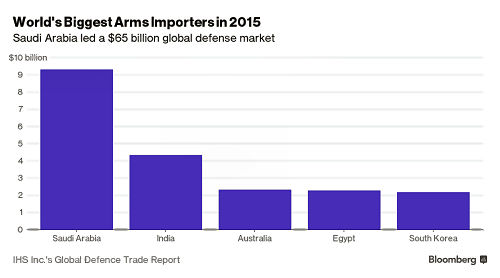
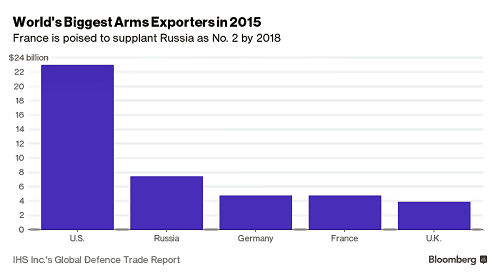
[4] The Syrian President, as Gaddafi did until recently, presides over a secular state. He does not want a caliphate. But the United States and Israel are promoting all the extreme groups and leaders in the Middle East who do want a caliphate to restore something akin to the Ottoman Empire, which relied on slavery for its administration and succession. Iran, although a Muslim state, presents a bulwark against Wahabism (Saudi Arabia's religion, which condones mass slavery). Iran did not have the same tradition of mass slavery as the rest of the Ottoman Empire. Farazmand, Ali (1998) “Persian/Iranian Administrative Tradition”, in Jay M. Shafritz (Editor), International Encyclopedia of Public Policy and Administration. Boulder, CO: Westview Press, pp 1640–1645 – Excerpt: "Persians never practiced mass slavery, and in many cases the situations and lives of semi-slaves (prisoners of war) were in fact better than the common citizens of Persia." (pg 1642). Cited in https://en.wikipedia.org/wiki/Slavery_in_Iran#cite_note-1 This article describes the aims of a caliphate. http://www.frontpagemag.com/fpm/261264/its-not-isis-we-need-beat-its-caliphate-daniel-greenfield
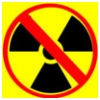 5 March 2012/Geneva: The announcement that North Korea (Democratic People’s Republic of Korea) will halt its enrichment of uranium, stop long-range missile and nuclear weapons testing, and allow international IAEA inspectors back into the Yongbyon nuclear facility is a major step forward to renewing progress in denuclearization of the Korean Peninsula.
5 March 2012/Geneva: The announcement that North Korea (Democratic People’s Republic of Korea) will halt its enrichment of uranium, stop long-range missile and nuclear weapons testing, and allow international IAEA inspectors back into the Yongbyon nuclear facility is a major step forward to renewing progress in denuclearization of the Korean Peninsula.
Candobetter.net received this press release from Green Cross International. It is a welcome announcement but we don't know much about Green Cross International. It seems to be into corporate charity spin, such as "smart water" and "development" in "poor countries", which we have come to associate with disaster capitalism. That's just going by its internet site at http://www.gci.ch/
Green Cross International welcomes North Korean suspension of uranium enrichment, calls for restart of Six-Party talks on Korean denuclearization
5 March 2012/Geneva: The announcement that North Korea (Democratic People’s Republic of Korea) will halt its enrichment of uranium, stop long-range missile and nuclear weapons testing, and allow international IAEA inspectors back into the Yongbyon nuclear facility is a major step forward to renewing progress in denuclearization of the Korean Peninsula, according to Green Cross International.
"This is a most welcome initiative by North Korea, especially in light of the upcoming Nuclear Security Summit in Seoul in late March," says Green Cross International (GCI) President Alexander Likhotal. “By reducing the nuclear threat, lasting peace can be achieved on the Korean Peninsula and wider region.”
GCI, which has advocated and promoted economic development and demilitarization globally since its founding by Mikhail Gorbachev in 1993, believes this initiative was welcome not only from an arms control and nonproliferation perspective, but also a humanitarian perspective.
Dr. Paul Walker, head of the GCI's Environmental Security and Sustainability Program, says: "240 thousand metric tons of food aid, as promised by the United States, will improve security and peacemaking on the Korean Peninsula, while nuclear bombs would have dramatically undermined it. The world is well aware of the dire economic and food situation in North Korea, and helping to save lives anywhere is a very worthy goal."
"North Korea, should it continue to follow through on nuclear disarmament, and join the nuclear, chemical, and biological arms control regimes, will establish a much more peaceful and prosperous northeast Asia for all,” Dr. Walker adds. “We urge the other parties in the six-party talks - China, Japan, Russia, South Korea, and the United States - to respond positively to this North Korea initiative and push for reopening long stalled negotiations."
Green Cross points out that South Korea had taken a major step forward several years ago when it unilaterally destroyed its chemical weapons stockpile under the watchful eyes of inspectors from the Organization for the Prohibition of Chemical Weapons (OPCW).
Green Cross International, founded in 1993 by Nobel Peace Prize laureate Mikhail Gorbachev, is an independent non-profit and nongovernmental organization working to address the inter-connected global challenges of security, poverty eradication and environmental degradation through a combination of advocacy and on-the-ground projects. GCI is headquartered in Geneva and is present in over 30 countries.
US Republican Congressman and past Presidential contender, Ron Paul opposes a bill to impose sanctions against Iran. In his speech, he describes how exactly the same bogus justifications were used for the imposition of sanctions against Iraq. Rather than satisfying the demands of the warmongers wielding power in the US at the time, they only paved the way for the subsequent illegal invasion.
This was first published on Information Clearing House on 22 Apr 2010. Please donate to ICH to help them continue their vital work.
By Congressman Ron Paul
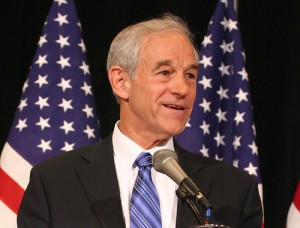
Statement of Congressman Ron Paul - United States House of Representatives
Statement on Motion to Instruct Conferees on HR 2194, Comprehensive Iran Sanctions, Accountability and Divestment Act - April 22, 2010
April 23, 2010 "United States House of Representatives" -- Mr. Speaker I rise in opposition to this motion to instruct House conferees on HR 2194, the Comprehensive Iran Sanctions, Accountability and Divestment Act, and I rise in strong opposition again to the underlying bill and to its Senate version as well. I object to this entire push for war on Iran, however it is disguised. Listening to the debate on the Floor on this motion and the underlying bill it feels as if we are back in 2002 all over again: the same falsehoods and distortions used to push the United States into a disastrous and unnecessary one trillion dollar war on Iraq are being trotted out again to lead us to what will likely be an even more disastrous and costly war on Iran. The parallels are astonishing.
We hear war advocates today on the Floor scare-mongering about reports that in one year Iran will have missiles that can hit the United States. Where have we heard this bombast before? Anyone remember the claims that Iraqi drones were going to fly over the United States and attack us? These “drones” ended up being pure propaganda – the UN chief weapons inspector concluded in 2004 that there was no evidence that Saddam Hussein had ever developed unpiloted drones for use on enemy targets. Of course by then the propagandists had gotten their war so the truth did not matter much.
We hear war advocates on the floor today arguing that we cannot afford to sit around and wait for Iran to detonate a nuclear weapon. Where have we heard this before? Anyone remember then-Secretary of State Condoleeza Rice’s oft-repeated quip about Iraq: that we cannot wait for the smoking gun to appear as a mushroom cloud.
We need to see all this for what it is: Propaganda to speed us to war against Iran for the benefit of special interests.
Let us remember a few important things. Iran, a signatory of the Nuclear Non-Proliferation Treaty, has never been found in violation of that treaty. Iran is not capable of enriching uranium to the necessary level to manufacture nuclear weapons. According to the entire US Intelligence Community, Iran is not currently working on a nuclear weapons program. These are facts, and to point them out does not make one a supporter or fan of the Iranian regime. Those pushing war on Iran will ignore or distort these facts to serve their agenda, though, so it is important and necessary to point them out.
Some of my well-intentioned colleagues may be tempted to vote for sanctions on Iran because they view this as a way to avoid war on Iran. I will ask them whether the sanctions on Iraq satisfied those pushing for war at that time. Or whether the application of ever-stronger sanctions in fact helped war advocates make their case for war on Iraq: as each round of new sanctions failed to “work” – to change the regime – war became the only remaining regime-change option.
This legislation, whether the House or Senate version, will lead us to war on Iran. The sanctions in this bill, and the blockade of Iran necessary to fully enforce them, are in themselves acts of war according to international law. A vote for sanctions on Iran is a vote for war against Iran. I urge my colleagues in the strongest terms to turn back from this unnecessary and counterproductive march to war.
Although the claims that Iran may obtain nuclear weapons in the foreseeable future are every bit as bogus as claims made about Iraq prior to the invasion of 2003, this poses the question: What would be an appropriate response on the part of the US if, instead, evidence of a program to build nuclear weapons had been found?
Arguably, an outright invasion and obliteration of much of Iran costing, perhaps, the lives of hundreds of thousands of Iranians, and at the risk of igniting a larger world-wide conflageration, most likely involving NATO, Russia, China, India and Pakistan, would remove from the world the nuclear threat posed by such an Iranian nuclear weapons program, but any reasonable person would consider such a cost and such risks completely unacceptable.
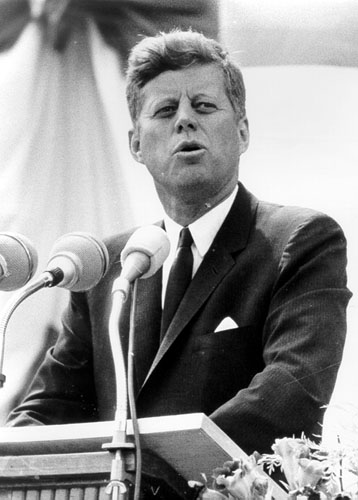
The fact remains that, as unsettling as the prospect of states such as Iran, or for that matter, India, Pakistan, France, and even Israel obtaining or already possessing nuclear weapons, is, the vastly greater threat of nuclear war posed to the world is by the US itself.
As James Douglass has shown in his monumental JFK and the Unspeakable - Why he died and why it matters, published by Orbis books in 2008 and 2009 on pages 28 to 29 and elsewhere, the US Joint Chiefs of staff were fully resolved, on at least three occasians in the early 1960's, to launch an all out nuclear strike against the USSR. It was only very good luck, combined with the extraordinary and unique courage of President Kennedy, which prevented that from occurring.
Also, according to retired CIA analyst, Ray McGovern in a videoed talk, embedded below, only a handful of principled senior military and intelligence professionals within the US, who refused tell Vice President Dick Cheney and former President George W Bush, the lies that they needed to hear, have prevented an invasion of Iran and possibly World War 3.
Clearly the greatest nuclear threat posed to humankind was and remains the US nuclear arsenal in the hands of the very military-industrial complex against which former President Eisenhower warned in his final address to the nation in 1961.
If President Kennedy had not been murdered by that military industrial complex on 22 November 1963, he would have been able to continue on his quest to rid the world of the scourge of nuclear weapons, the first step of which was his Government's ratification of the atmospheric nuclear test ban treaty with the USSR in 1963.
Today, only the US has within its power to comprehensively remove the threat that nuclear weapons pose to humanknd. To achive that would require another national leader as visionary and courageous as was President Kennedy was.
The other implicit justification for an invasion of Iran is that it is necessary to re-establish democracy. In truth, the election victory that allowed the current Government to retain power is questionable, and it remains the heir of the astonishingly brutal regime of Ayatollah Khomeini which came to power after the overthrow of the dictatorship of the Shah in 1979. (The Shah, himself, was imposed as the result of a CIA-orchestrated coup against the popular elected Government of Mohammed Mossadeq in 1953.)
Nevertheless, to accept that western Governments, who routinely act contrary to the democratically expressed wishes of their consituents, as examples, against the bail-out of the Wall Street financial racketeers in September 2008, and against the fire sale of AU$15 billion of publicly owned assets in Queensland in 2009 and 2010, have any intention of bring democracy to Iran, would require an enormous degree of credulity.
Whatever 'democracy' may emerge from the ruins of a conquered Iran will, at the very best, be no better than the formal supposed democracies that exist in the US and Australia and, far more likely, akin to the dictatorship of Paul Bremer over Iraq of 2003-2005, which oversaw the ransacking of public wealth by crony US capitalists and the consequent impoverishment of Iraqis. (The Shock Doctrine, (2007) Naomi Klein, pp 325-422)
Recent comments